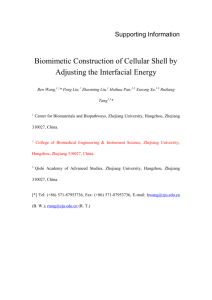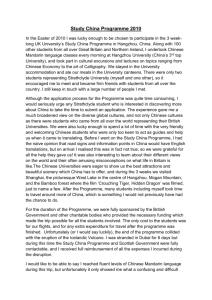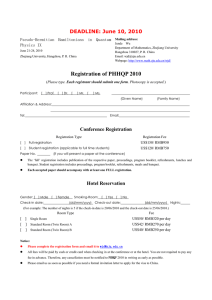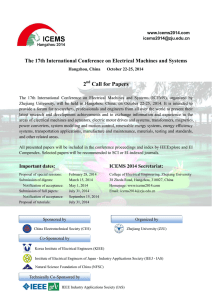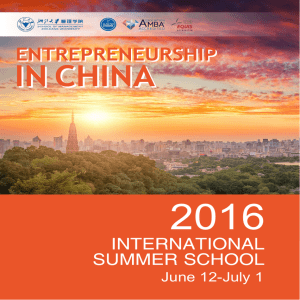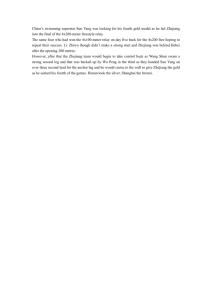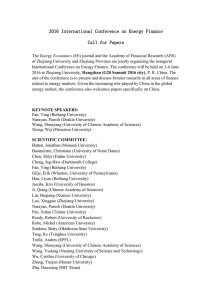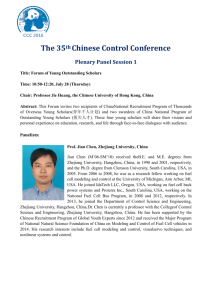1st Conference on “Modernism and the Orient”
advertisement
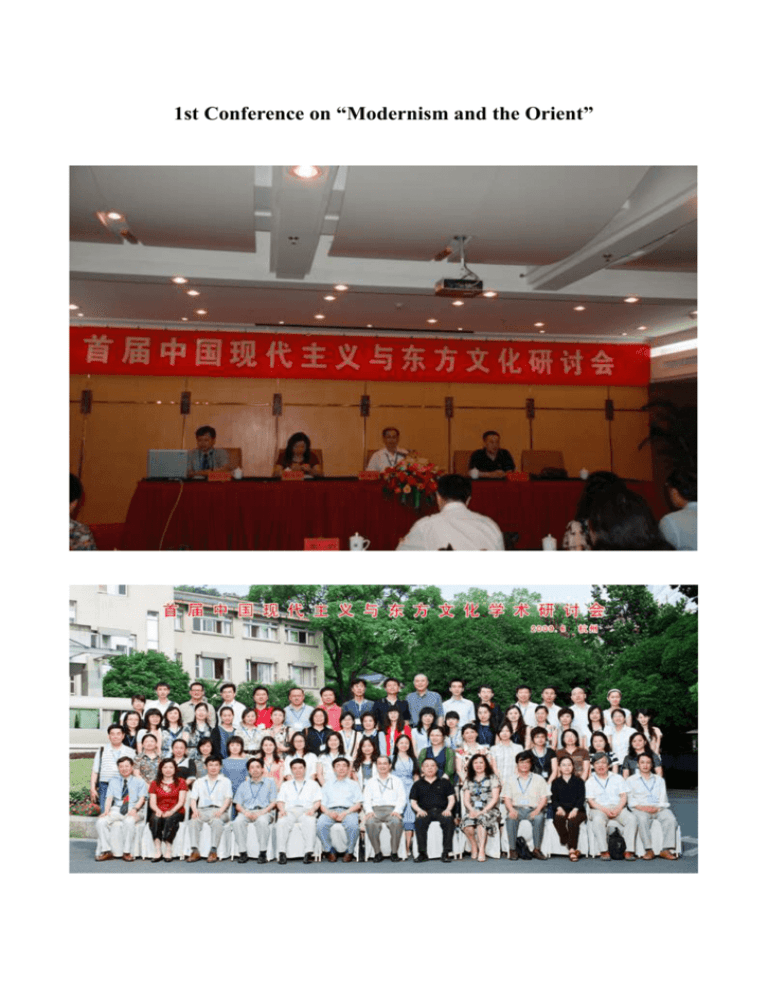
1st Conference on “Modernism and the Orient” China’s First Conference on “Modernism and the Orient” took place June 13-14 at Santai Shanzhuang on the western side of the West Lake in Hangzhou. Jointly-sponsored by Zhejiang University (ZJU) School of International Study’s (SIS) Institute of English Literatures, University of New Orleans College of Liberal Arts, the Editing Board of Foreign Literature, Zhejiang Association of Foreign Languages and Literatures, and Translators’ Association of Zhejiang, the event had its theme singularly illuminated by the surrounding hills and waters, a setting compared by Marco Polo 700 years ago to Venice and lauded as “the noblest and most beautiful in the world.” The conference was intended to be a preliminary to a 3rd International Conference on “Modernism and the Orient” to be held in Hangzhou in June 2010. The first two international conferences on the topic were held at Yale University (US) in 1996 and at Cambridge University (UK) in 2004, respectively. 76 scholars and students from 28 Chinese and American universities and organizations attended the Hangzhou Conference, and 28 of them delivered papers exploring the relationships of China, Japan, and India to western modernism across the fields of literature, music, fine arts, religion, and philosophy. The opening session on June 13 was presided by ZJU SIS Associate Dean Yin Qiping. Welcome speeches by ZJU leader Fan Jieping and ZJU SIS Dean He Lianzhen were followed by five keynote addresses: Qian Zhaoming of University of New Orleans on “William Carlos Williams, Marianne Moore, and Their Hangzhou Collaborators”; Sun Hong of Renmin University of China on “Ezra Pound’s Misreading/Reconstruction of Classic Chinese Poetry”; Zhang Deming of Zhejiang University on “Kafka’s Imagination of China: At The Building of Great Wall of China”; Ou Hong of Sun Yat-sen University on “J. H. Prynne’s Chinese Poetic Flavour”; and Gao Fen of Zhejiang University on “Virginia Woolf and Sense of Reality: From the Perspectives of Chinese and Western Poetics”. Three discussion panels were held in the afternoon. Eight panelists (including two graduate students) in Group A gave papers. Their topics ranged from “Cubist View of Pound and Moore,” “Chinese Music in Cathay,” “Cutural Context in ‘The River-merchant’s Wife,’” and “Creative Treason in Pound’s Translation ‘Lament of the Frontier Guard” to “Orientlism in Amy Tan’s Joy Luck Club,” “Cubism in William Gass and Yu Hua,” “Artistic Freedom in John Fowles’ Fiction,” and “Construction of Masculinity in Modern Chinese and Western Literatures.” Five scholars in Group B spoke--one on Emily Dickinson and China, two on Eliot, and two on Richard Wright’s Haiku poems. Panelists in Group C focused on “Modernist Theories and the Orient.” They discussed topics covering cross-cultural Chinese studies, late symbolism’s salvation discourse and Hinduism, Zen and Susan Sontag’s “Against Interpretation,” Zhuangzi and Oscar Wilde, Wang Guowei’s Artistic Realm Theory in the perspective of phenomenology, American transcendentalism and ancient Chinese civilization, Wallace Stevens and Chinese tea culture. On the morning of June 14, three more keynote addresses were given: Fan Jieping of Zhejiang University on “Modernity of the Literary Mask: Doeblin, Walser, and China”; Zhang Jian of Beijing Foreign Studies University on “Hindu and Buddhist Legacy in The Waste Land and Four Quartets,” and Lin Lidan of Indiana-Purdue University on Beckett and Chinese Music.” These were followed by summaries of the panel discussions by representatives. In his closing address, conference director Qian Zhaoming encouraged increased exploration of the topic and asked participants to return to Hangzhou for the 3rd international conference on the theme. In the afternoon, participants took a tour of the former residence of Hu Xueyan, a successful Qing dynasty businessman and Hefang Street by the West Lake. The tour added a finishing touch to the success of the event.
